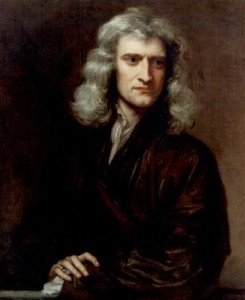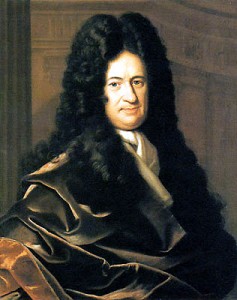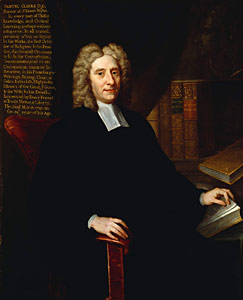[Note: In my seminar on “The Scientific Revolution” this semester, I assigned graduate students to write a blog post that, once revised by the class during a workshop, I would publish on my “Labyrinth of Nature” blog. This is the third piece from that seminar, by Master’s history student J.D. Wolflick.]
In 1687, Isaac Newton published his Principia Mathematica, a work that many historians consider the culmination of the Scientific Revolution. Its supreme achievement was a universal theory of gravity and inertia that mathematically described both terrestrial and celestial motion
Although Newton was able to mathematically describe gravity’s action on bodies, he created a philosophical controversy by being unable to describe the mechanism by which it acted. “But hitherto I have not been able to discover the cause of those properties of gravity from phenomena,” he wrote in the Principia, “and I feign no hypotheses.” Newton’s unwillingness to “feign” a hypothesis for how gravity was able to act at a distance across empty space earned the ire of the Cartesians, to whom Newton’s theory smacked of unintelligibility and the “occult”. Earlier in the 17th century, the French philosopher René Descartes had proposed that attraction was caused by vortices acting on a very light fluid that filled the space between the planets. This theory became dominant among natural philosophers of the era, and for the Cartesians, anything short of a mechanical explanation was unacceptable. In the early 18th century, the debate reached a high point in an exchange of letters between a proponent of the Cartesian view, German philosopher Gottfried von Leibniz, and the Newtonian, Dr. Samuel Clarke, an English theologian and philosopher. Gravity was only one topic in a debate that included matters such as: the attributes of God as the Creator – and, for Newton, the sustainer – of the universe, the nature of matter and space, and whether or not the universe is infinite and eternal.
Leibniz asserted that Newton’s theory of gravity requires a constant miracle of bodies acting on one another at a distance through the void of space. Clarke replied that gravity can be non-mechanical, but still a natural phenomenon: “But the means by which two bodies attract each other, may be invisible and intangible, and of a different nature from mechanism; and yet, acting regularly and constantly, may well be called natural.” Leibniz then accused Newton of making gravity a “Scholastic occult quality”. Although Leibniz meant this as a slight, Clarke accepted the fact that Newton had only discovered the manifest quality of gravity, but that its cause remained “occult”.The problem of occult qualities in nature was still relevant despite the efforts of the mechanical philosophers. In addition, the meaning of “occult” had changed. As historian Keith Hutchison explains:
When the seventeenth century opened, “occult” had the double connotation of “insensible” and “unintelligible” … Over the course of the Scientific Revolution, the intelligibility of many insensibles was recognized, and the distinction between the sensible and the insensible lost most of its earlier force … Accordingly, the bond between the two ideas was broken, and “occult” lost the connotation of “insensible,” to retain only that of unintelligibility…But the Cartesians were willing to introduce occult qualities in the old sense of the word into their science only on condition that they were not occult in the new sense, that is, that mechanical explanations could be framed for them.
Newton was perfectly willing to accept an occult cause for gravity if it was regular and predictable. Leibniz would only accept a mechanical, albeit insensible, cause for gravity. Yet if Leibniz were still alive today, he would be disappointed, because he lost the debate. Gravity does indeed act at a distance across empty space with no material intermediary.
By J.D. Wolflick (MA candidate, history)
References:
H.G. Alexander, ed. The Leibniz-Clarke Correspondence (New York: Philosophical Library, Inc., 1956).
K. Hutchison, “What Happened to Occult Qualities in the Scientific Revolution?” Isis, 73 (1982).
A. Koyré, From the Closed World to the Infinite Universe (Baltimore: Johns Hopkins University Press, 1957).









Revisiting Leibniz’s Einstein-like, geometrical theory of gravity
https://williameamon.com/?p=382
“Leibniz asserted that Newton’s theory of gravity requires a constant miracle of bodies acting on one another at a distance through the void of space. Clarke replied that gravity can be non-mechanical, but still a natural phenomenon: but the means by which two bodies attract each other, may be invisible and intangible, and of a different nature from mechanism; and yet, acting regularly and constantly, may well be called natural. Leibniz then accused Newton of making gravity a Scholastic occult quality. ”
Newton apparently believed that the force of gravity was continually being calculated as
suggested above to follow the law he had discovered. Thus gravity acted on bodies in a mechanical fashion which Leibniz referred to as being continually “occult” or “miraculous”.
Leibniz, on the other hand, had a more geometrical concept that, being geometrical,
foresaw Einstein’s geometrical concept of gravity. In Einstein’s theory, the masses of bodies
cause the space around them to curve, so as to provide particular arcs of flighty, such as that
of planets revolving around the sun. He may thus have been so influenced by Keplar, who
explored the geometrical properties of planetary motion.
Leibniz accordingly wrote, in his “Mathematical Principles of Natural Philosophy”,
http://www.archive.org/stream/mathematicalpri01machgoog/mathematicalpri01machgoog_djvu.txt
[spelling modernized]
“Whence it [is] that the planets came to be retained within
any certain bounds in their free spaces, and to be drawn off
from the rectilinear courses, which, left to themselves, they
should have pursued, into regular revolutions in curvilinear
orbits, are questions which we do not know how the ancients
explained; and probably it was to give some sort of satisfaction
to this difficulty that solid orbs were introduced. “
indicating that, while Leibniz believed that Newton’s mechanical theory of gravity
was wrongly conceived, Leibniz did not at that time know how the force should
be expressed to accord with his geometrical concept of gravity.
Dr. Roger B Clough NIST (ret.) [1/1/2000]
See my Leibniz site at
http://independent.academia.edu/RogerClough
Apologies for the only tangential relevance of my question, sir, but I would like to ask what you think of Darwin’s invocation of Leibniz’s criticism of Newton in defence of his (Darwin’s) inability to explain the origin of life (except as an act of God, but this he thereupon interpreted as meaning ‘by unknown processes’).
‘… species have been modified, during a long course of descent, by the preservation of many successive slight favourable variations…. It is no valid objection that science as yet throws no light on the far higher problem of the essence or origin of life. Who can explain what is the essence of the attraction of gravity? No one now objects to following out the results consequent on this unknown element of attraction; notwithstanding that Leibnitz formerly accused Newton of introducing “occult qualities and miracles into philosophy.’ [Origin of Species, 3rd edition, 1861, p. 514; and later editions similarly]
This doesn’t work for me as an argument, and I am trying to formulate my objections:
For one thing, ‘origin’ and ‘essence’ are rather different.
For another, the question of the origin of life is in an historical relationship with the evolution of life theory, surely. Not the case with gravity and its essence.
For a third, Darwin already has something with two layers – 1) common descent from one or a few primordial forms; 2) a hypthosesis about a causal mechanism for this – natural selection.
If anything, I would be more inclined to have Newton’s law of gravity as analogous to common descent; and the searched for essence or cause of gravity as natural selection. Not that this works very well either, so far as I can see.
I have been looking for a critical discussion of Darwin’s argument, but haven’t found one yet – except a reply by Bronn, as part of an exchange on the topic: http://www.darwinproject.ac.uk/DCP-LETT-2934 ‘the two cases are far from analogous’.
Andrew
My PhD thesis argued that reasons of cognitive complexity are not causes. I believe it is available as “The Causal Theory of Action”via the usual doctorate retrieval services. I am working on the comparative “explanation theory” comparison(s) between the dubious reductionist demands that bedrock explanations of mental content must ‘connect’ to brain states and such parallels that worried Newton over Leibniz charge of occultism.
Because physics strikes science as the gold standard of explanation, I find the easy acceptance of “curved space” throws the demand for propositional reduction to physiological function equivalent to the hunt for magical matter.The latter hunt denounced by Newton.